In Southern Africa, Harvester termite alates (Hodotermes spp.) and Mound-building termite alates (Macrotermes spp.) swarm within a specific area usually once a year. These alates are winged termites, which termite workers keep within certain chambers in the mound. They represent both sexes and are released by the working termites after rains. The release is either at one go or staggered in more batches. What and how exactly this release(s) is(are) triggered is still unknown to science.
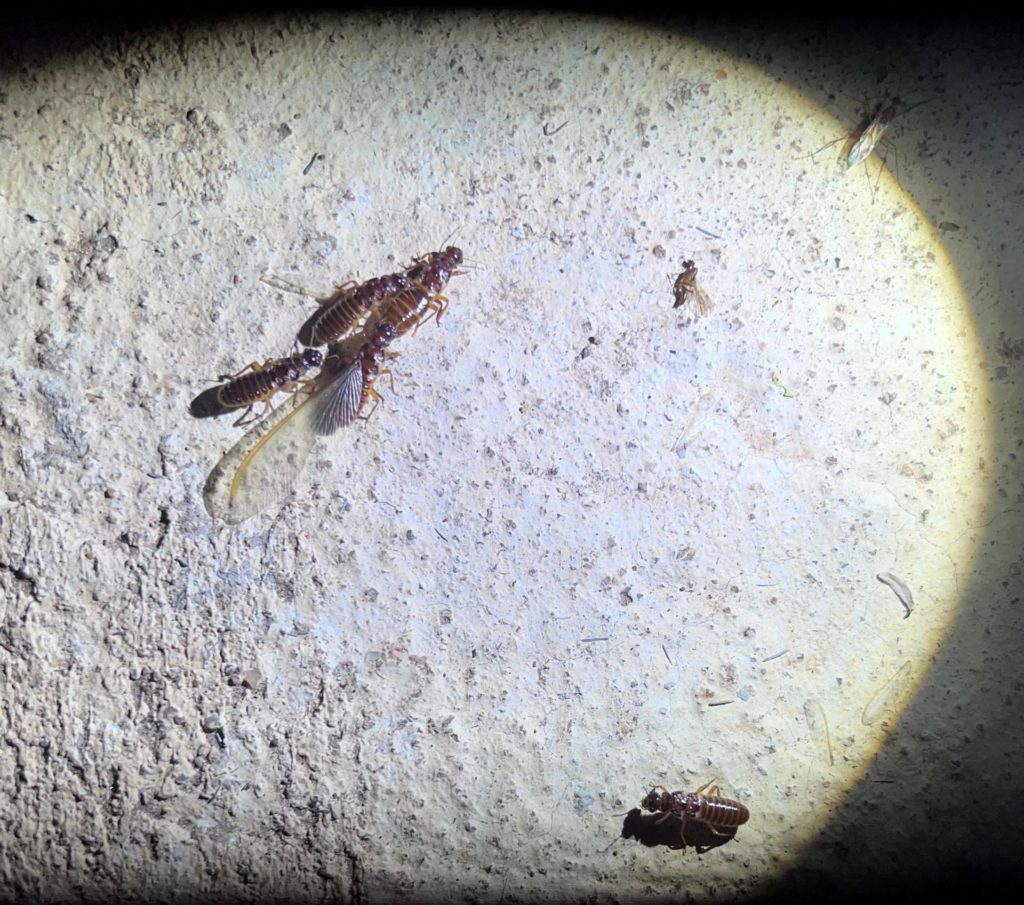
Termite alates swarming
If conditions are right, termite alates leave their nests or mounds in great numbers simultaneously. That’s called swarming. And it takes about 20 minutes for all of them to leave their old home for good. After flying for 10 minutes, they settle on the ground and shed their wings.
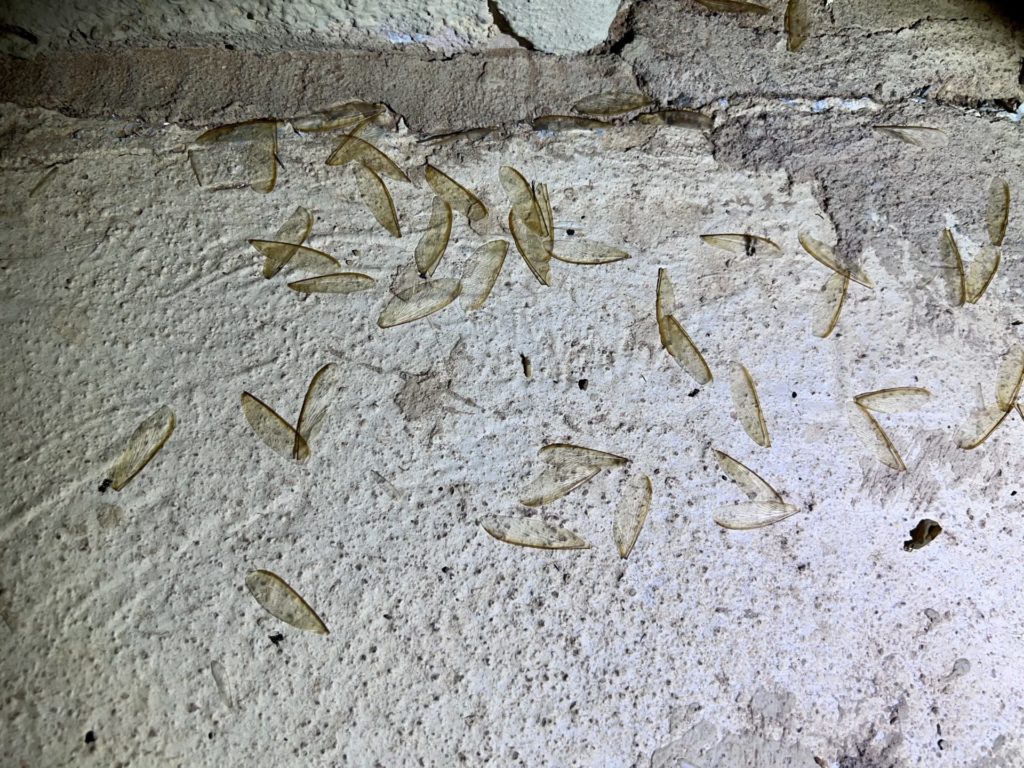
This wing shedding does not need considerable effort, as the axles have a predetermined breaking point. The triangular-shaped axle points of the four wings will remain lifelong on the termite.
After settling to the ground, females lift their abdomens and release traces of pheromones, which attract males. Therefore, often, more males follow one female. One male succeeds in moving with the female to a batch of wet ground. There, they dig an about 2.5 cm / 1’’ deep hole, which they close immediately and start breeding a new colony.
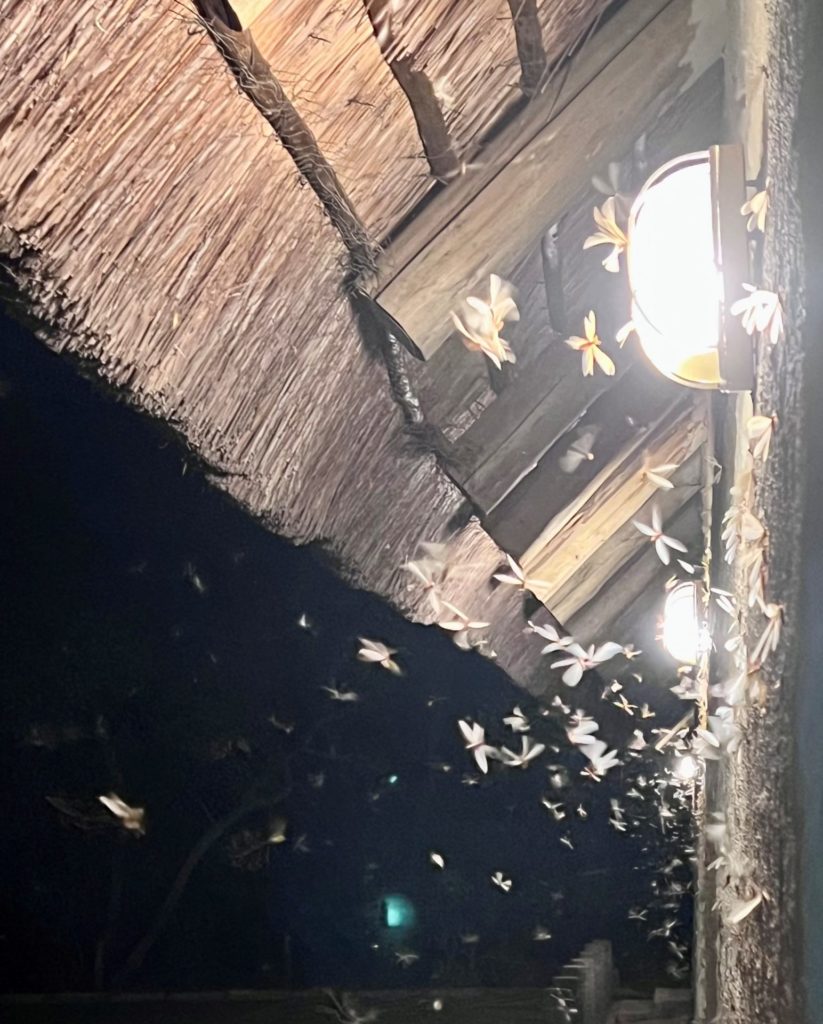
Nutritional value of termite alates
Swarming termites are a feast for a wide variety of predators. All alates – if males or females – are filled to the brim with energy, which ensures that two termite alates can breed and nurture six termite offspring in the first year, just by their stored energy. Further details on the fat body composition of termites can be found under this link.
In Venezuela, termite alates’ nutritional value was measured, resulting in a 6,88 kcal/g dry mass value. See this link.
Catching of termite alates and preparation by roasting

For a long time, man was also one of the top predators. However, eating insects is not én vogue; only the older generation in many African countries recalls their childhood feasts. During a sudden swarming outbreak, Mrs. Ampfarisaho (Ampfi) Tshitangomo, of Venda descent, showed us how these swarming termite larvae were consumed in her village.
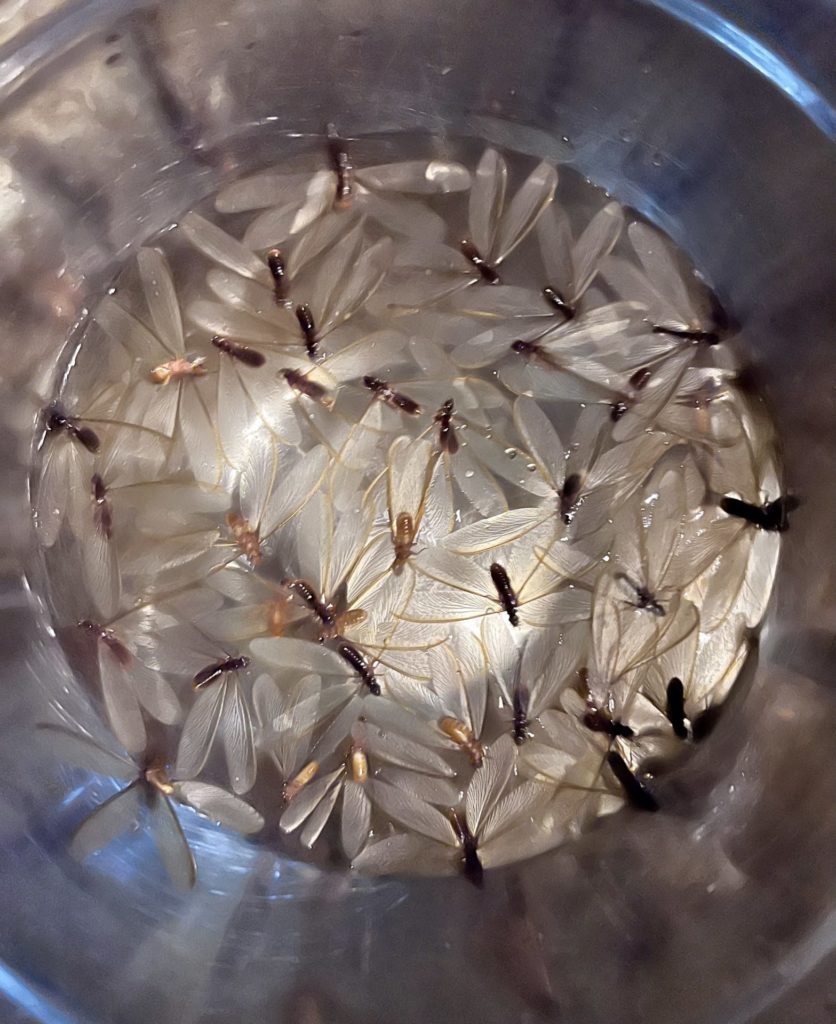
Catching termites singly is quite a work. It is better to find the holes from which the swarm is emerging, and scooping them up with both cupped hands is more effortless. After having a handful, they should be thrown into a bowl with water. Due to the high surface tension of the wings in the water, they cannot fly away anymore.
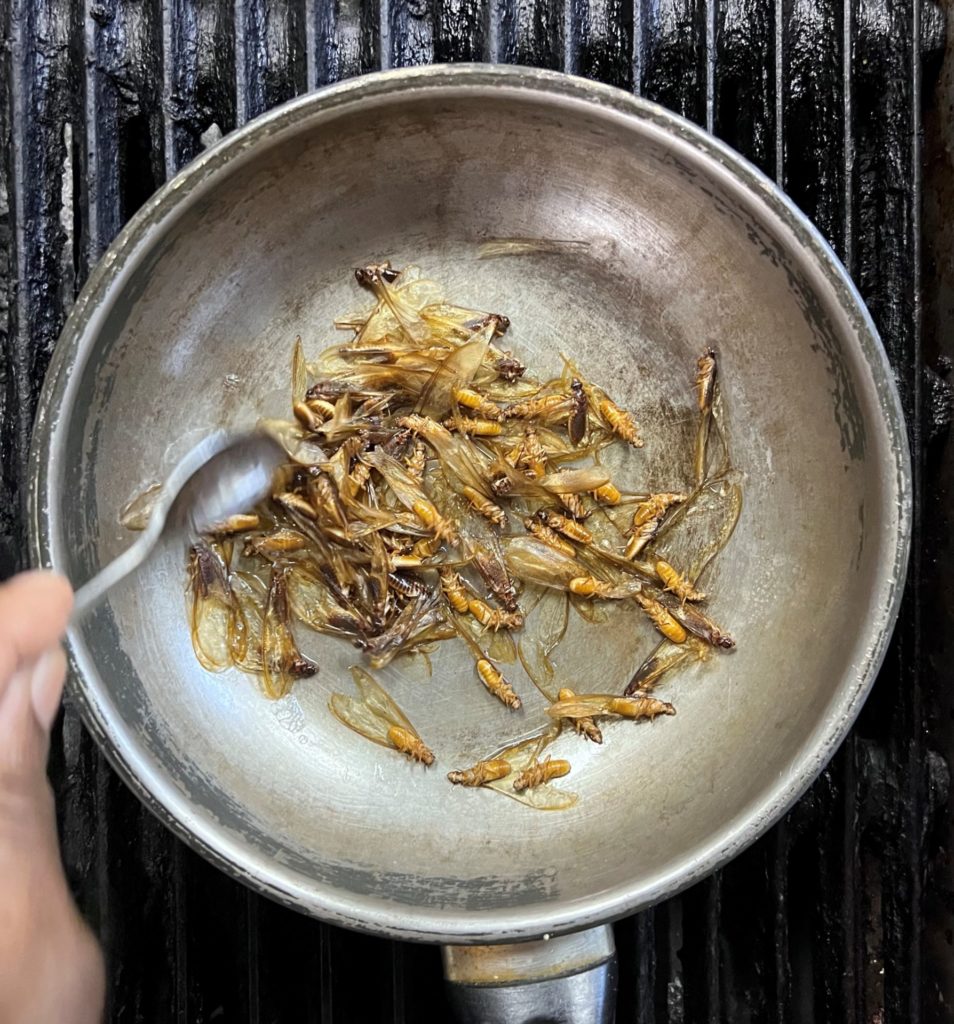
When enough termites are caught, they should be scooped into a hot frying pan without oil. Always fluff them up with your fingers; they should not get burnt or stuck to the pan bottom until they get crispy. After that, salt is mixed into water, and this salted liquid is poured over the semi-crispy termites in the pan.
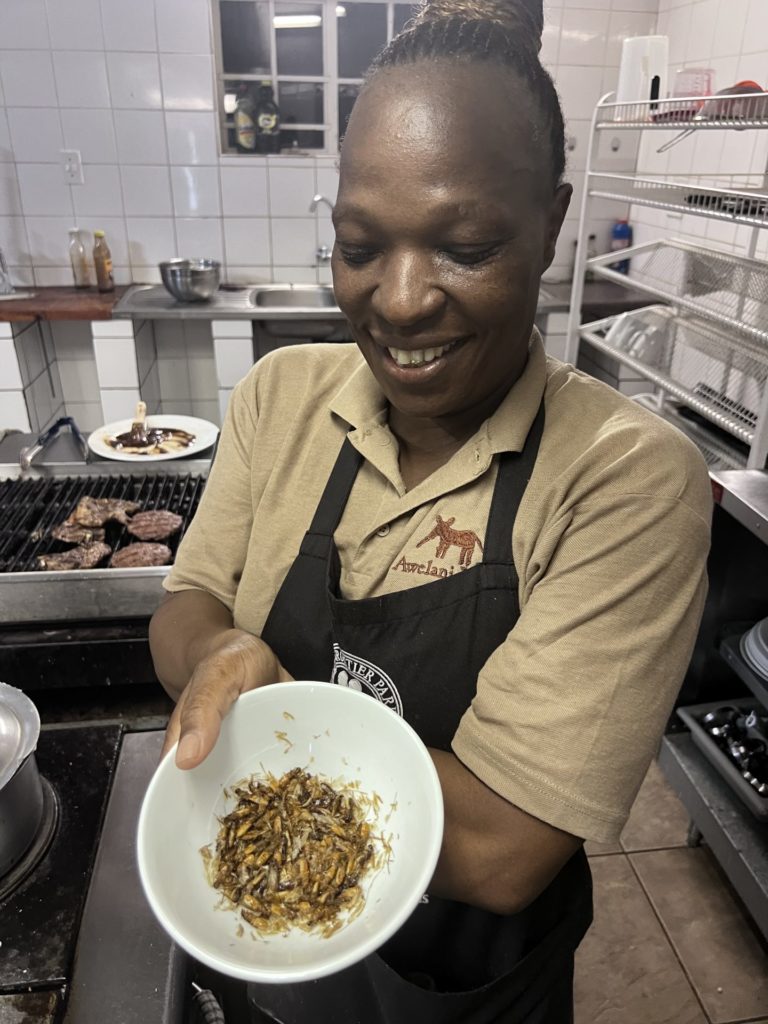
Again, fluffing up with fingers and being very careful not to touch the hot bottom of the pan. When the termites are crispy, they are rubbed with their fingers all over so that they lose their wings. They are brought outside after being put in a bowl (termite bodies and crushed wings). By blowing into the bowl, the crushed wing pieces are removed.

Eating roasted termites

After that, the big feast is on. Roasted termite bodies taste very pleasantly like roasted peanuts—and they even have a similar addiction factor to peanuts. It’s challenging to stop eating them. All of us—my wife, daughter and I—greatly liked them. Mrs. Ampfi rolled her eyes in remembrance of her time at home, and the lodge cook laughed silently because he was eating and preparing them for himself whenever the opportunity arose.
For comparison, I also ate raw and live termite alates. They tasted fresh and sweet and were not bitter or had any off-putting taste.
Lessons learned about eating termite alates:
- It is always a surprise when termite alates start swarming
- They can be caught in great numbers directly at their holes, where they emerge.
- Putting them into water will hold them securely
- Salting them improves their taste when roasting
- Saltwater distributes the salt more evenly compared to solid salt grains
- Wings should be removed by rubbing the termite bodies
- Roasted termite alates taste like roasted peanuts.
.


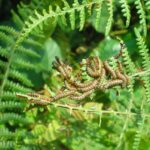
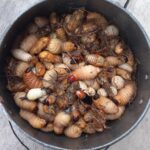

2 comments
ubani
i am in Nigeria it is too plenty where i leave ..do you think it can be exported?
Kurt Hoelzl
In my opinion, it can be exported from Nigeria but not imported into other countries due to biohazard reasons. However, that is just an opinion. It must be verified with the authorities to determine if the export is permitted. Furthermore, what types of processing and certifications are necessary for import with the authorities of the importing country? I think that is a thorny road ahead. Better yet, catch the termites, roast them, and enjoy yourself.😊